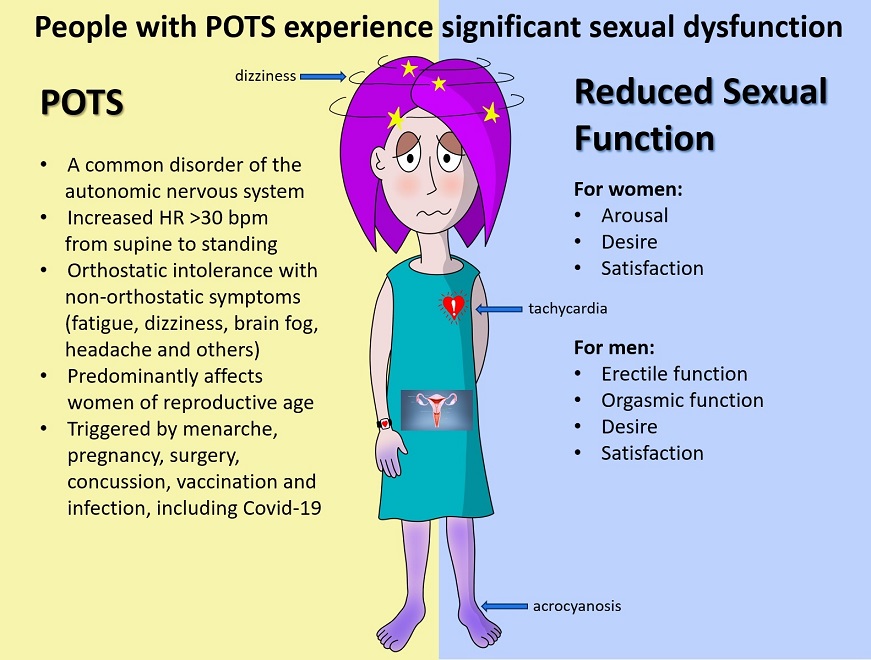Nikhil Prasad Fact checked by:Thailand Medical News Team May 20, 2024 10 months, 3 weeks, 3 days, 13 hours ago
Medical News: Imagine standing up and suddenly feeling your heart racing, your head spinning, and your world tilting. This is a daily reality for individuals with Postural Orthostatic Tachycardia Syndrome (POTS), a condition that disrupts the autonomic nervous system, which controls bodily functions such as heart rate and blood pressure. POTS is predominantly diagnosed in women of reproductive age and often follows events like growth spurts, pregnancy, surgery, or infections, including COVID-19.
 Postural Orthostatic Tachycardia Syndrome (POTS) Linked To Sexual Dysfunction
Unveiling the Hidden Impact: Sexual Dysfunction
Postural Orthostatic Tachycardia Syndrome (POTS) Linked To Sexual Dysfunction
Unveiling the Hidden Impact: Sexual Dysfunction
Recent research conducted by the University at Buffalo and the Dysautonomia Clinic in New York that is covered in this
Medical News report has shed light on a critical, yet often overlooked, aspect of POTS: its impact on sexual function. The study aimed to determine whether patients with POTS experience more sexual dysfunction compared to their healthy counterparts. The findings were striking and underscore the importance of considering sexual health in the overall management of POTS.
Methodology: A Detailed Approach
The researchers used a robust methodology involving several validated questionnaires to assess various aspects of health and sexual function. These included the COMPASS-31 for dysautonomia symptoms, Beck’s Depression Inventory Second Edition (BDII), Female Sexual Function (FSF) questionnaire, and the International Index of Erection Function (IIEF) questionnaire. They compared the responses of 160 women and 29 men with POTS to those of age-matched healthy controls.
Significant Findings: Sexual Dysfunction in Women with POTS
The study revealed that women with POTS scored significantly lower in sexual desire, arousal, and satisfaction compared to healthy controls. These findings were consistent even after accounting for depression, a common comorbidity in POTS patients. This suggests that the sexual dysfunction observed in women with POTS is intrinsically linked to the disorder itself rather than being a mere byproduct of associated depressive symptoms.
Men's Experience: Erectile and Orgasmic Challenges
Men with POTS also reported significant sexual dysfunction. They scored lower in erectile function, orgasmic function, sexual desire, and overall satisfaction compared to healthy men. Interestingly, while age was a predictor of sexual dysfunction in men, depression and the severity of autonomic symptoms were not. This distinction highlights different underlying mechanisms of sexual dysfunction between genders in POTS patients.
Depression: A Compounding Factor
Depression scores were notably higher in both male and female POTS patients compared to healthy controls. Among women, there was a significant negative correlation between sexual function and depression scores. However, this relationship did not hold when controlling for the severity of autonomic symptoms, indicating a complex interplay between t
hese factors.
Clinical Insights: The Role of Specialized Care
The study included a subgroup of patients from the Dysautonomia Clinic, who reported lower autonomic and depressive symptoms but still experienced significant sexual dysfunction. This suggests that while specialized care may help manage some symptoms of POTS, sexual dysfunction remains a persistent issue. Pain scores were higher in clinic patients, likely due to comorbid conditions such as Ehlers-Danlos syndrome and small-fiber neuropathy, which are common in POTS and associated with pelvic pain.
Broader Implications: Quality of Life and Reproductive Health
Sexual dysfunction can severely impact quality of life, intimate relationships, and overall well-being. For young patients with POTS, who are often in the prime of their reproductive years, this can also affect reproductive health. Understanding and addressing sexual dysfunction is thus essential for comprehensive patient care.
The Autonomic Nervous System and Sexual Function
Sexual functioning is closely tied to the autonomic nervous system, which regulates sexual arousal and response. The balance between sympathetic and parasympathetic fibers is crucial for various phases of sexual response, such as desire, arousal, and orgasm. Disruptions in this system, as seen in POTS, can therefore lead to significant sexual dysfunction.
Comparing with Other Neurological Disorders
Sexual dysfunction is common in many chronic conditions, including multiple sclerosis, Parkinson’s disease, and chronic migraine. The study draws parallels between these conditions and POTS, noting that depression is a common predictive factor for sexual dysfunction across these disorders.
Hormonal Influences and POTS
Hormonal fluctuations play a significant role in the symptoms and course of POTS. Women with POTS report increased symptoms during menstrual cycles and pregnancy, suggesting a link between estrogen levels and autonomic dysfunction. This hormonal interplay may also contribute to the observed sexual dysfunction.
Comorbidities and Their Impact
Common comorbidities of POTS, such as Ehlers-Danlos syndrome, migraine, and autoimmune disorders, are also associated with sexual dysfunction. These conditions can exacerbate POTS symptoms and further complicate sexual health, highlighting the need for a multifaceted approach to patient care.
The Role of COVID-19
POTS and other autonomic dysfunctions are increasingly recognized as part of Long COVID. Studies have found high rates of sexual dysfunction in post-COVID patients, underscoring the importance of considering autonomic health in the aftermath of the pandemic.
Future Directions: Research and Clinical Care
This pioneering study underscores the need for further research to understand the relationship between POTS and sexual dysfunction. Longitudinal studies examining changes in sexual function over time in response to treatment are essential. Moreover, developing targeted interventions to improve sexual health outcomes in POTS patients is crucial for enhancing their overall quality of life.
Conclusion: Addressing an Unmet Need
The findings from this study highlight a significant, yet unmet, need in the care of POTS patients. Sexual dysfunction is a prevalent issue that requires attention and intervention as part of a comprehensive, patient-centered approach to managing POTS. By recognizing and addressing this aspect of the disorder, healthcare providers can significantly improve the well-being and quality of life of those affected by POTS.
The study findings were published in the peer reviewed Journal of Clinical Medicine.
https://www.mdpi.com/2077-0383/13/8/2274
For more about POTs, keep on logging to Thailand
Medical News.
Read Also:
https://www.thailandmedical.news/news/contrary-to-claims-that-covid-19-mrna-jabs-protect-the-vulnerable-cedars-sinai-study-finds-that-they-trigger-pots-in-many-with-underlying-conditions
https://www.thailandmedical.news/news/long-covid-news-postural-orthostatic-tachycardia-syndrome-pots-and-dysautonomia-are-common-occurrences-in-long-covid
https://www.thailandmedical.news/news/covid-19-news-researchers-warn-that-unique-types-of-sars-cov-2-related-arrhythmias-known-as-fascicular-tachycardia-are-materializing-in-children
https://www.thailandmedical.news/news/breaking-covid-19-new:-european-meta-study-validates-that-sars-cov-2-infections-can-cause-cardiovascular-autonomic-dysfunction-in-many
https://www.thailandmedical.news/news/coronavirus-news-mayo-clinic-study-shows-that-covid-19-can-cause-dysautonomia
